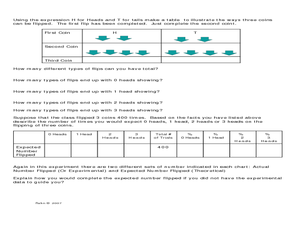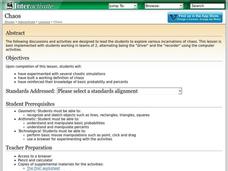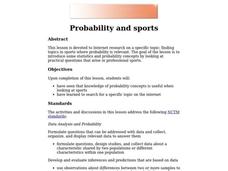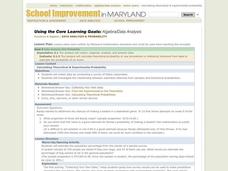Curated OER
Why Isn't It 50-50
Students comprehend the difference between the outcome of the experiment and the outcome that they expected. They analyze outcome of probability experiment and compare theoretic and empirical results. Pupils discuss the difference in...
Curated OER
Playing With Probability
Students rotate through work stations where they compute problems of theoretical and experimental probability. In this probability lesson plan, students use simulations of a lottery system.
Curated OER
Let's Flip a Coin
For this probability worksheet, students use a TI graphing calculator to simulate flipping a coin and compare their results (experimental probability) to the expected results (theoretical probability). The five page worksheet contains...
Curated OER
Probability
Sixth graders explore the concept of probability. In this probability lesson, 6th graders collaborate to collect spinner data based on the likelihood of spinning odd and even numbers. Students complete 2 other probability activities and...
Curated OER
Chaos
Students explore the concept of probability. In this probability lesson, students use a applet that demonstrates chaos and probability of spread for a forest fire. Students also play applets about the Game of Life and Rabbits and Wolves,...
Curated OER
Phenomenological Probability
Students explore the concept of theoretical and experimental probability. In this theoretical and experimental probability lesson, students roll dice, draw marbles out of a bag, and draw a card from a deck of cards. Students perform each...
Curated OER
Theoretical and Empirical Probabilities
In this probability activity, students determine the theoretical probability of given events. Topics include choosing a card at random, number cubes, and fractions. This one-page activity contains ten problems.
Curated OER
Theoretical Probability
In this math instructional activity, students investigate the ratio comparing the number of ways an event can occur using theoretical probability.
Curated OER
What is Probability? Original Lesson Plan
Students predict, using a fraction or a ratio, the possibility of an event happening and place that fraction or ratio on a Likelihood Line. In Part Two of the lesson, they conduct an experiment to determine theoretical and experimental...
Curated OER
Probability Lesson Plan
Your learners will examine probability through experiments and dice games. Using a computer, your class will perform simple experiments to collect and analyze data to determine the probability of different experimental results. Students...
Curated OER
Probability and Sports
Learners research topics on the internet where probability is relevant. Students study statistics and probability concepts by looking at practical questions that arise in professional sports.
Curated OER
Calculating Theoretical & Experimental Probability
Students explore the concept of experimental and theoretical probability. In this experimental and theoretical probability lesson, students collect data by conducting a survey of their classmates. Students compare their data and discuss...
Curated OER
Designing Models to Simulate Actual Events Using a Table of Random Digits
Students design models to simulate actual events using a tale of random digits. They estimate the likelihood of a particular outcome using results of simulation. Students investigate the uses of statistical methods to analyze data.
Curated OER
Chaos
Students experiment with several chaotic simulation, they build a working definition of chaos. Students reinforce their knowledge of basic probability and percents. They are reminded of previous knowledge that is pertinent to this...















